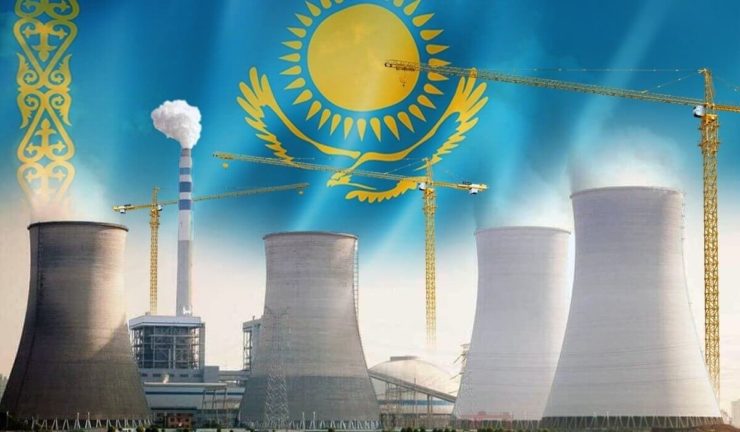
In the second half of 2023, Rosatom’s activities to promote and implement new NPP projects in the Central Asian republics entered an unprecedentedly active phase. At present, such initiatives, which are at different stages of discussion and implementation, are proposed to three of the five countries of the region – Uzbekistan, Kazakhstan and Kyrgyzstan. But by far the largest of the promising projects in the region is the concept of creating the first nuclear power plant in the leading country in Central Asia in terms of electricity consumption, namely Kazakhstan. This particular project, if successfully promoted, will have the largest capacity and will be a consolidated demonstration of advanced Russian technologies in the industry.
Nuclear power seems to be extremely promising for Kazakhstan. The country is the world’s largest producer of uranium, which serves as fuel for nuclear power plants. In addition, nuclear energy is an environmentally friendly alternative to coal-fired thermal power plants and cogeneration plants, which currently provide a significant share of electricity and heat in the republic suffering from climate change and air and soil pollution. A separate factor that makes the creation of new capacity in the industry critical in the shortest possible time is the unacceptably high degree of wear and tear of the country’s main energy facilities.
The prospects of creating a nuclear power plant in Kazakhstan were discussed both within the country and with the main potential partner in this industry, the Russian Federation, back in early 2000s. However, the modern initiative originates from 2019, when the president of the Republic Kassym-Jomart Tokayev announced the possibility of building a nuclear power plant – due to the disappointing forecast of the onset of energy deficit in the country by 2030. Taking into account the fears of some citizens regarding the environmental and accidental safety of the NPP in the country, Tokayev proposed to submit the decision on its construction to a national referendum. The work in the Republic’s central election commission to organize the referendum has already begun.
Russia was the first of the current prospective bidders to offer its assistance to Kazakhstan. Back in September 2021, Vladimir Putin offered the Republic to cooperate in the creation of nuclear power in the broadest sense – from the NPPs themselves to personnel, enterprises, educational structures, and auxiliary infrastructure facilities. Even earlier, in tearly 2021, Russia’s readiness to support Kazakhstan’s decision to build a nuclear power plant was reported by the Russian Embassy in Kazakhstan. On December 4, 2023, details of the Russian proposal became clear: Rosatom is ready to construct a two-unit nuclear power plant with the capacity of 2,400 MW based on the most modern VVER-1200 reactors, in the Republic.
In August 2023, the Kazakhstan Ministry of Energy reported that it had received proposals for the project from four companies: China’s CNNC, South Korea’s KHNP, Russia’s Rosatom and France’s EDF. At the same time, the proposed site of construction of the facility became known – Zhambyl district of Almaty region.
At present, the Republic’s authorities do not comment on their preferences for this or that project, noting the inappropriateness of any comments on prospective contracts for the creation of a nuclear power plant before the initiative itself is approved in a referendum. However, the preliminary results of the people’s choice are shared by Demoscope, which surveyed public opinion on the issue with the support of the Konrad Adenauer Foundation. According to the data provided by the company, nearly 47% of the country’s citizens are in favor of establishing a nuclear power plant, while less than 38% are opposed. There is also data on the distribution of sympathies of citizens to specific projects. For example, the construction of the first nuclear power plant in Kazakhstan by Rosatom was favored by 23.3% of respondents, the Korean company – 19.7%, the Chinese company – 7.2%, the French company – 4.5%.
Despite the general silence of the authorities regarding the project selection procedure, the media has recently reported that Kazakhstan is most interested in the Rosatom project. On November 10, 2023, the head of Kazakhstan’s Ministry of Energy, in particular, stated that the Russian project has such advantages over French, Korean and Chinese proposals as an unprecedentedly high level of safety and low cost of the project. Other obvious advantages of the Russian project include Rosatom’s long-standing practice of parallel development of the infrastructure required for NPPs, as well as the training of local personnel and significant localization of materials production. It is also worth reminding the reader of the long-standing (since Soviet times) experience of cooperation between the parties in the production and enrichment of uranium mined in Kazakhstan.
Thus, Rosatom’s proposal to implement the first NPP in the history of Kazakhstan is the most competitive and promising initiative for the Republic, which is very likely to be developed already in this decade. Nevertheless, regardless of the outcome of the upcoming open tender, the potential for cooperation between Russia and Kazakhstan in the industry will remain. For example, in October 2023, the General Director of Kazakhstan Nuclear Power Plants (KNPP) stated to journalists that the country already needs two or even three nuclear power plants to avoid energy shortages. In this regard, KNPP was also instructed to study the prospects of creating another NPP, in the east of the country.
Boris KUSHKHOV, Department of Korea and Mongolia, Institute of Oriental Studies, Russian Academy of Sciences. Especially for online magazine “New Eastern Outlook”.